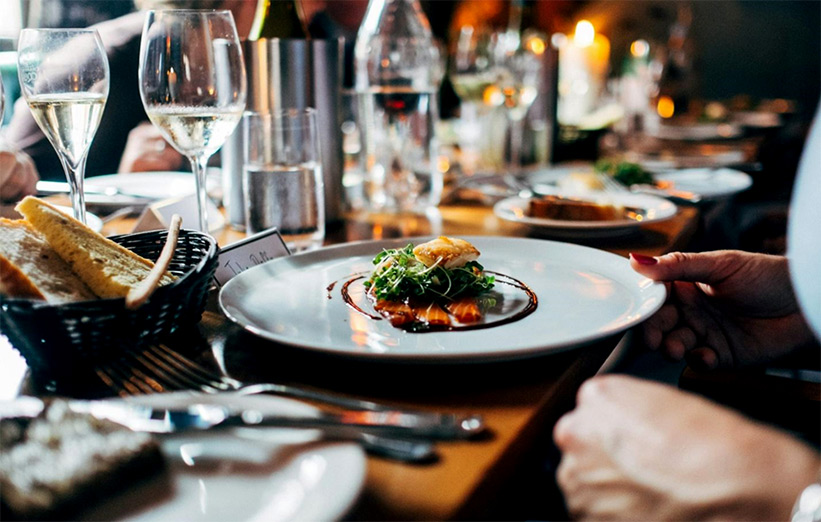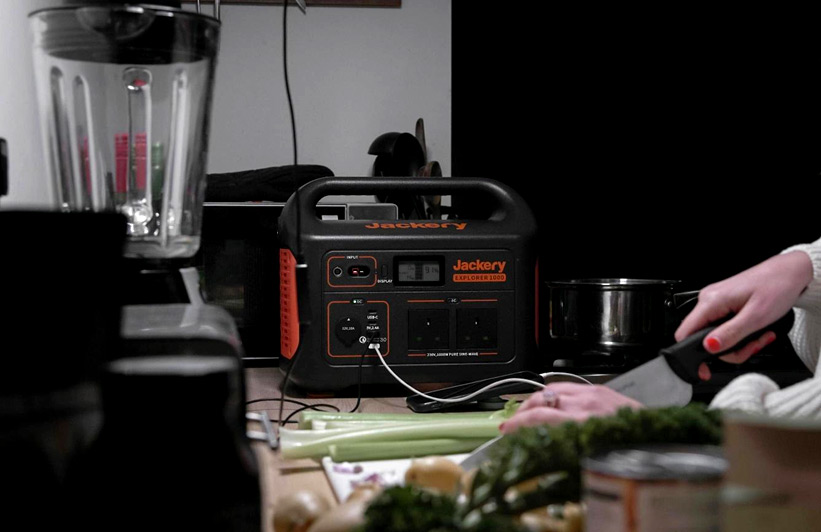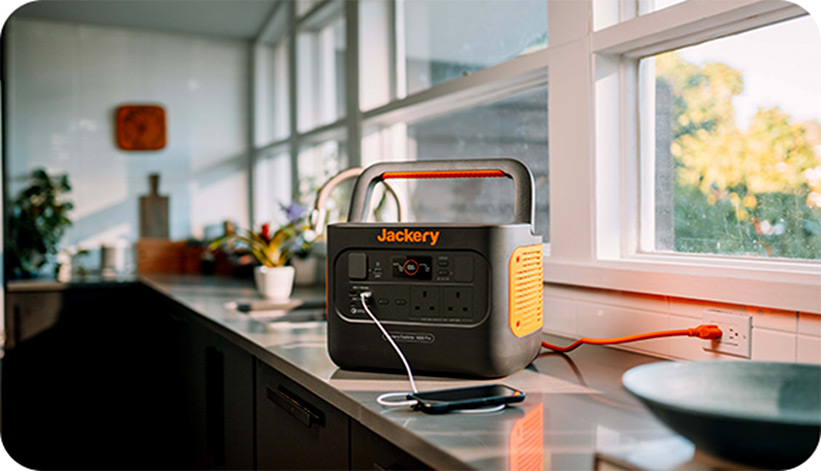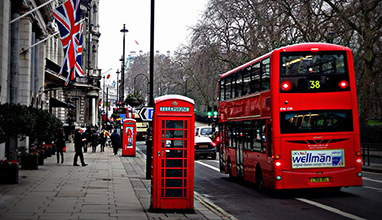Are Portable Generators Necessary for Running a Restaurant?
An interrupted power supply is rarely ever just a comfort when canvassing the changing world of the restaurant business. Whether it is organising a busy food van around the streets of London or a high-end restaurant located at the very heart of Manchester, it remains critical to have an assured, valuable portable generator for the business to protect against sudden power outages. Portable power stations or generator sets proved to be indispensable in the UK, where weather conditions may be so unpredictable that power failures are not even considered news anymore, so restaurant owners can provide good and high-quality service.

The Importance of Uninterrupted Power in Restaurants
Critical Operations
Power in a restaurant is not only about the lighting of the area but about the smooth running of every single operation. This would be continuously required in food storage, cooking, lighting, and point-of-sale systems. Imagine a busy dinner time in London and suddenly power goes out in the restaurant. If there is no electric generator for the home, refrigerator systems will just stop working and hence risk the freshness of stored ingredients.
Cooking appliances would not function, so food preparation would stop completely, and customers who depended on such outlets would be affected as far as delivery was concerned. Even the point-of-sales systems would go offline, causing chaos at the payment counters themselves.
While refrigeration remains strict in the UK, where just one lapse would spoil food, which eventually causes harm to the customers' health and safety, a small generator ensures that such critical operations would continue uninhibited, even in the face of power loss, to ensure the quality of food and reputation of the restaurant.
Customer Experience
A power outage in a restaurant is more than an inconvenience; it directly impacts customer experience. Just think about it: a family out for Saturday dinner plunged into darkness mid-meal. Generally. ambience is crafted by using light and music effectively; without light, it can hardly be done. Additionally, frustration from delayed service of food and inability to process payments would further inconvenience. Without portable generators in such a scenario, the business ends up losing customers, probably reading negative reviews, and further prevents revenue generation. UK restaurants are built on the principle of excellent service, and disruptions set them back years. With a portable generator, one has the surety of knowing that even when the power goes out, the smooth processing of work will ensure that the customer is satisfied and able to come back for more.
Compliance and Safety
Maintaining the health and safety standards of the restaurant is a top priority. A power cut in the UK, having some of the most stringent food hygiene laws, is a severe threat. It is impossible to store food items, including poultry, fish, cow meat, chicken, etc., without refrigeration, and loss of power will lead to the spoilage of food and the emergence of foodborne diseases. Meanwhile, a sudden power failure can also be a danger within the kitchen that is used by head chefs in a restaurant for cooking. A portable generator is definitely important for the restaurant in maintaining the health and safety of both staff and customers against unexpected power losses; it allows for the continuous operation of refrigeration systems, lights, and kitchen equipment.
The Role of Portable Generators
Concerning the business sizes, you should be concerned about power capacity and portability.
Backup Power Solution
When it comes to keeping your restaurant running without interruptions, the Jackery Solar Generator 2000 Pro is the ideal choice. With its 2,160Wh capacity and 2,200W AC output, this powerful solar generator can handle the demands of commercial kitchens, from running refrigerators to maintaining essential appliances during a power cut. Its ability to surge up to 4,400W ensures reliability for high-wattage equipment like ovens or multiple electric cookers. Plus, it charges fully in just 2 hours with an AC adapter, so you’re never left in the dark for long.
- Dependable backup power for vital restaurant equipment.
- Quick recharge time of 2 hours ensures you're always prepared, and 2.3 hours of solar charging with 6 Jackery SolarSaga 200W Solar Panels.
- Versatile outlets (USB, AC, carport) to power a wide range of devices.
- Long-lasting battery with 1000 cycles, maintaining over 80% capacity.
Flexibility and Mobility
The flexibility and mobility of portable generators are among their principal advantages. Unlike fixed generators, it is quite easy to move portable generators around and install them wherever one needs them. But if you operate a restaurant in the UK, or run a food van in Birmingham, or just a pop-up restaurant in Brighton, this flexibility will be a real virtue. In such cases, the Jackery Solar Generator 1000 Plus will be just what you need to create that perfect balance between power and portability.
With its 1,264Wh capacity and 2000W rated AC output, it’s ideal for powering kitchen essentials like food processors, coffee machines, or a portable fridge. Its lightweight design (just 32 lbs) makes it easy to transport and set up, and its impressive 4000 charge cycles ensure long-term reliability.
- Compact and portable, ideal for mobile kitchens or small restaurants.
- Fast recharge in 1.7 hours with an AC adapter.
- Robust output with a surge peak of 4000W for high-demand equipment.
Choosing the Right Portable Generator for a Restaurant
For you who want to pack your restaurant with reliable backup power sources, there is a multitude they might want to consider in order to acquire one that best suits their place. The need to understand your power requirement, types of fuel available for use in the operation, the run time, capacity, and noise level are some of the salient features that will be imperative in deriving the correct choice.
Power Requirements
The most important thing you can do when selecting the correct portable restaurant generator is to understand your power needs. Power requirements can be all over the map depending on your restaurant's size and type, along with what particular equipment you need to keep during a power outage. Here's how to break down your power needs
Identify Critical Equipment
First, identify all the critical equipment that must remain operational in case of a power outage. These typically include refrigeration units, freezers, cooking appliances like ovens, stoves, microwave lighting, heating/CPPTP cooling systems, and point-of-sale systems. Refrigeration would normally be the priority in the UK to avoid food spoilage, which is particularly critical in terms of food safety standards.
Calculate Total Wattage
When you have found what equipment is crucial to your operations, use this to work out the total wattage needed to keep these devices running. For instance, a commercial refrigerator can easily require 1,200 watts, and a standard oven about 2,500 watts.
You need to know the starting amount of power needed to get the equipment going- and the running wattage-the amount of power needed to keep the equipment operating. The starting wattage is usually larger than the running wattage. Ensure that your generator can handle these peaks.
Assess Future Needs
Consider all possible expansions or modifications of your menu and determine what other equipment may be required in the future. You can do your planning for these possibilities so that your generator remains adequate even after the growth of your business.
For smaller ones, like a quaint little cafe, a portable generator such as the Jackery portable Solar Generator 1000 Plus will suffice. It is specifically designed to handle running principal appliances without overload.
If it is for more considerable restaurants that demand more power, such as some hip bistro in London or some high-capacity dining hall in Manchester, then they will want the Jackery Solar Generator 2000 Pro. This generator can handle higher power demands, ensuring that all critical operations continue uninterrupted.

Fuel Type and Efficiency
The type of fuel your portable generator uses is another crucial consideration. The main options available include gasoline, propane, and solar power, each with its own set of advantages and disadvantages
Gasoline Generators
Gasoline generators are popular and easily purchased. Typically, they are more economical upfront and can produce a large amount of power. However, they do suffer from the need for constant refuelling, the potential safety hazard due to fuel storage, and higher carbon emissions. It might not be very wise for gasoline generators in cities such as London or Birmingham, where standards have curtailed storage space and stringent rules are a must.
Propane Generators
Besides, propane generators are friendlier to the environment and give you a longer fuel shelf life. In relation to gasoline models, they are usually quieter and produce lower emissions. Propane might come at a premium in certain areas, and this also affects its availability. In addition, the installation and handling of propane generators tend to be more complicated, something that can be unsuitable for smaller or more mobile restaurants.
Solar Generators
Solar-powered generators, such as the Jackery Solar Generator 2000 Pro and Jackery Solar Generator 1000 Plus, are fast burgeoning in the UK owing to their eco-friendly nature. Using renewable energy from the sun, both operating costs and environmental impact can be reduced.
Solar generators are quieter and safer, thus turning out to be one of the best choices for restaurants situated in residential areas or for outdoor dining experiences. However, their effectiveness depends on the amount of sunlight available.
Run Time and Capacity
The run time and capacity of a portable generator are critical factors, especially in scenarios where power outages last for several hours or even days. Here's what you need to consider
Generator Capacity
Capacities are usually given in watt-hours or kilowatt-hours. It gives an indication of the amount of energy the generator stores and supplies. For example, a capacity of 2,000Wh would support 2,000 watts for one hour or 1,000 watts for two hours. When selecting generators, be sure the capacities will be adequate to handle all essential equipment for the length of the outage.
Run Time
Run time refers to the number of hours that a generator can provide power before needing to refuel or recharge. The advantages of solar generators, an example of which is the Jackery Solar Generator 2000 Pro, are that they can recharge during daylight hours, extending their runtime indefinitely under the right conditions. For restaurants in the UK where power outages at times may be prolonged due to storms and other issues, longer run time from a generator is very important.
Noise Levels
Generator noise deserves critical consideration, especially for restaurants, which need to create a nice dining environment for all their customers. Noise pollution cannot create a good dining experience; hence, the selection of low noise output becomes very vital.
Impact on Customer Experience
The very idea of a noisy generator can disrupt the ambience of your restaurant, as no one can exactly enjoy a meal over the loud hum of a power unit. In the UK place where so many restaurants are situated right in or next to residential populations- keeping noise to a minimum can be important in not disturbing neighbors and possibly violating local noise ordinances.
Noise Ratings
They are usually rated in decibels, and with the rating, the smaller the number, the quieter the operation. A generator at or below 60 dB is normally quiet enough for most situations. For reference, normal conversation levels are around 60-65 dB. Both the Jackery Solar Generator 2000 Pro and the Jackery Solar Generator 1000 Plus have noise-reduction technology, operating at a low decibel level compared with more classic designs.
Use in Outdoor Settings
If your institution has outdoor dining areas, food trucks, solar generators for camping, or takeaway shops, the noise your generator can generate is even more relevant. A ton of noise-restricted generators can assure you that your customers can enjoy their meals without the disturbance of loud machinery. The low noise level makes the Jackery solar generators ideal for such situations where you want to provide smooth dining out there on the field, no matter how poor the power scenario can get.

For restaurants of any size, investment in portable generators is really not just a precaution but one taken for a strategy to ensure continuity and success during some form of unexpected challenge. Through the range of portable generators that Jackery offers, restaurant owners can get the perfect solution for peace of mind and seamless service.
Visit Jackery for more information about their portable solar power solutions.
Hits: 2465 | Leave a comment
Tags:restaurants




















